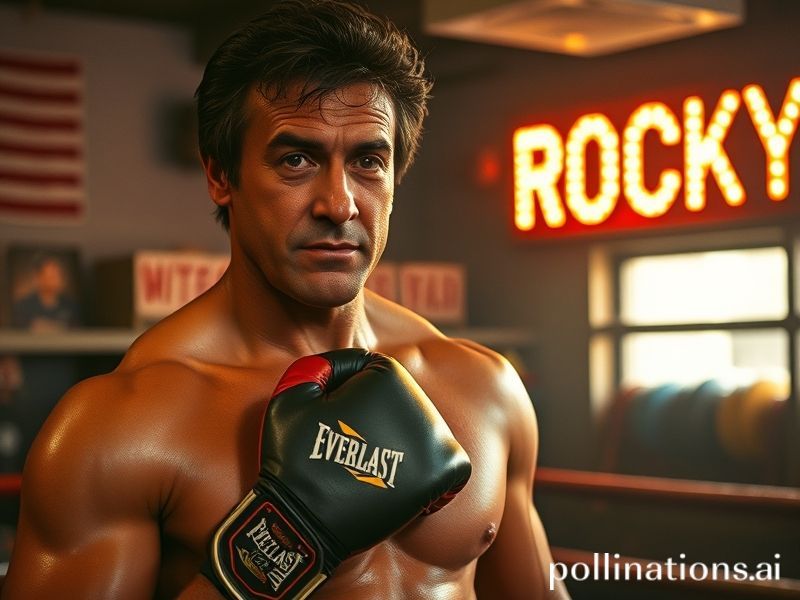Sylvester Stallone: How a 77-Year-Old Underdog Became the Planet’s Most Exported Myth
Sylvester Stallone: The Last American Gladiator Exported to a World That’s Tired of Heroes
By Dave’s Locker, International Affairs Desk (and occasional boxing correspondent)
Geneva, 2024. While the United Nations debates whether artificial intelligence should be allowed to write its own resignation letters, a 77-year-old man in a Panama hat just landed at Cointrin airport clutching a rolled-up movie script like classified war plans. His name still causes traffic jams in Manila, prompts spontaneous push-up contests in Serbian gyms, and, according to a recent YouGov poll taken entirely without irony, is more recognizable than the current Secretary-General. Yes, Sylvester Gardenzio Stallone—rhymes with “alone,” which is how most of us feel when contemplating global masculinity—remains the planet’s most durable piece of soft power.
From the barrios of Bogotá to the bomb shelters of Kharkiv, Stallone’s filmography has become a sort of Rosetta Stone for the aggrieved male id. Rambo’s red headband once fluttered on makeshift flagpoles during the 1989 Romanian revolution; in 2023, a Kurdish militia painted “ADRIAN!” on the side of a captured ISIS technical, presumably because “Give Peace a Chance” doesn’t fit neatly on tank armor. Somewhere in Pyongyang, state censors reportedly splice Rocky IV into morale reels, proving that even totalitarian regimes understand the motivational value of a well-timed training montage. If NATO ever collapses, don’t be surprised when the last communique is simply a looping GIF of Rocky punching frozen meat.
The numbers are almost Soviet in their implausibility. Stallone’s films have grossed over four billion dollars internationally—that’s enough to bribe every customs officer from Lagos to LaGuardia and still finance a small coup in a midsize republic. Creed III opened bigger in China than in the U.S., demonstrating that even a country allergic to individualism will pay to watch one guy hit another guy in the face if the lighting is sufficiently cinematic. Meanwhile, streaming analytics (leaked by a disgruntled intern at a Luxembourg data farm) show Rambo: Last Blood trending in Myanmar, where viewers reportedly use VPNs to watch a geriatric American obliterate Mexican cartels as vicarious therapy against their own junta. The algorithm, like Stallone himself, does not appear burdened by nuance.
Critics—those self-anointed custodians of “proper” art—like to sniff that Stallone’s oeuvre is merely violence wrapped in populist myth. To which the global box office replies, “Precisely.” In an era when trust in institutions evaporates faster than a cryptocurrency exchange, the moral clarity of a lone underdog punching through corruption feels almost quaint, like finding a rotary phone that still connects to God. The French call it “le cinéma du biceps existentialiste”; in Lagos traffic, it’s simply Tuesday.
Stallone himself seems aware of his role as planetary folk hero. He has parlayed the Italian Stallion brand into vitamins hawked in Riyadh pharmacies, luxury watches flogged to oligarchs in Dubai, and a clothing line that appears to be made entirely from shredded American flags and regret. Recently he announced a director’s cut of Rocky IV with 38 additional minutes of robot butler dialogue—because nothing says Cold War catharsis like extended scenes with a mute Roomba in a bow tie. The man is 77, but his business model is forever 29 and bench-pressing reality.
What does it mean that a New York kid who once slept in a bus station now serves as a secular saint for every kid who’s ever been told he’s too small, too brown, too poor, or simply too late to matter? Perhaps it means the world is still desperate for uncomplicated narratives, even if they arrive wrapped in steroid allegory. Or maybe it means that in the collective human psyche, the most seductive fantasy isn’t wealth or power—it’s the idea that persistence can still beat the house. Stallone sells that delusion wholesale, shipping containers of it to every port where hope is tariff-free.
As COP28 delegates argue over carbon credits and the Arctic melts into artisanal ice cubes, Stallone prepares to film another sequel, reportedly titled Rambo: Last Stand at the Climate Summit. Plot leaks suggest the climax involves a shirtless septuagenarian single-handedly strangling a coal lobbyist with a reusable grocery bag. It will earn a billion dollars, win zero Oscars, and screen simultaneously in refugee camps and presidential palaces. Because in the end, the world doesn’t want solutions—it wants abs wrapped in the flag, delts dripping with redemption, and the comforting lie that if we just keep punching, the credits will eventually roll on something like justice.
Lights up. Cue the horns. Roll global despair in 5, 4, 3…







